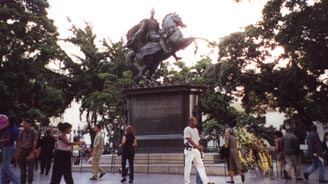 |

Statue of Simón Bolívar in
Caracas
We left Juneau in the early
afternoon of Saturday, December 16, 2000, and didn't arrive in Caracas
until after midnight a day and a half later. We had a six-hour layover in
Seattle which gave us some time to hit Southcenter Mall for last-minute
provisions. Cathy and Rick met us in Seattle and we finally boarded a
red-eye flight for Chicago close to midnight of the first day. After a
morning in the Chicago airport we hopped our last flight to Caracas. I got
my first opportunity to speak Spanish with a man sitting next to me on the
Miami-Caracas leg. He knew English, but he humored Jason and I as we
chatted with him in Spanglish. He told us about the mud slides that wiped
out the cities near the airport last year, and that he worked for
Movilnet, Venezuela's wireless communications company. I faked
understanding him a lot of the time, though, so I was nervous about how
well my Spanish skills would hold up once we were in the country.
My excitedness hadn't allowed for
much sleeping throughout this ordeal, so by the time we arrived in
Venezuela I was running on adrenaline. Facing customs was laughingly easy,
a quick stamp and you're on your way, no words spoken nor any eye contact.
I smiled and said "Grácias" nonetheless. We caught a por puesto
from the airport to Caracas proper. These were essentially cabs that
waited around until they were full before leaving. Travelling in a group
of twelve, however, tends to eliminate any waiting. Since it was the
middle of the night, Caracas was deceptively quiet. We found a hotel and
crashed for the night, por fin, at around 1:30 AM.
I managed a few hours' sleep until
the cacophony of city noise awakened me. That morning we had our first
meeting going over our plans and procedures, then we were off into the
city. Caracas is crowded, very big, and extremely noisy. Along every
sidewalk are merchants' tables, selling everything from clothing to fruit
to music. The music stands in particular were fascinating feats of
engineering; they had to be able to not only hold at least a few dozen
CD-Rs or tapes for sale but also be able to blast the tunes into the
passing crowd at maximum volume. So they'd be CD racks, an amp, and
however many speakers they could fit grafted together with wheels
attached. These sidewalk music vendors were my first introduction to
Venezuelan music, as well as to what I now call the First Law of
Venezuelans and Technology. This law states that if a technology exists,
it must be used, and it can't be used just part way. It must be cranked
up! Thus when it came to stereos and radios, volume was the only thing
that really mattered. I can recall only one stereo from the entire month
that could actually handle the loudness it was being asked to play.
Usually everything was cranked until it was a giant, unrecognizable cloud
of distortion.
Every city we visited in Venezuela
had a Plaza Bolívar, usually a block set aside in the central part of the
city with a statue honoring Simón Bolívar, the country's beloved
liberator. Above is the picture of the one in Caracas, which we visited
that first day.
We only stayed in Caracas a couple
days, although for awhile it looked like we were going to be stuck there.
Since we arrived shortly before Christmas, all the bus lines we called
were booked up for nearly a week. Our second afternoon after we held
class, Rick and Cathy went to the bus terminal itself and secured tickets
to Ciudad Bolívar.
|

